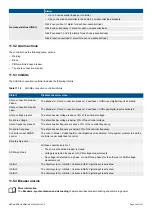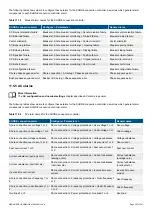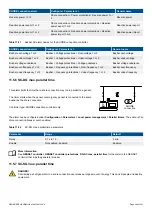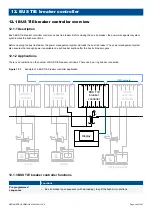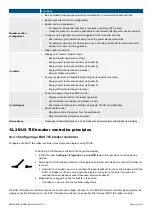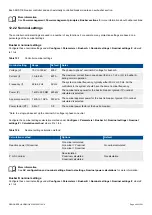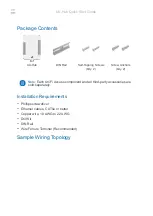
Table 12.16
BUS TIE breaker controller inhibits
Inhibit
Disables the alarm when ...
Bus tie breaker closed
The
Breakers > Bus tie breaker > Feedback > BTB Closed
digital input is activated.
Bus tie breaker open
The
Breakers > Bus tie breaker > Feedback > BTB Open
digital input is activated.
Controller under SWBD
control
The
Mode > Switchboard control
digital input is activated, OR a system problem forced the controller
under switchboard control.
ACM wire break
All these conditions are met:
•
The bus tie breaker is closed
•
Voltage is detected by one set of ACM voltage measurements
•
No voltage is detected on a phase, or on all three phases for the other set of ACM voltage
measurements
Inhibit 1
The
Alarm system > Inhibits > Activate inhibit 1
digital input is activated.
Inhibit 2
The
Alarm system > Inhibits > Activate inhibit 2
digital input is activated.
Inhibit 3
The
Alarm system > Inhibits > Activate inhibit 3
digital input is activated.
12.5.4 Breaker alarms
More information
The
Breakers, synchronisation and de-loading
chapter describes breaker handling and alarms in general.
The following table shows where to configure these alarms for the BUS TIE breaker, as well as which general alarm corresponds to
each BUS TIE breaker alarm.
Table 12.17
Breaker alarm names for the BUS TIE breaker controller
BUS TIE breaker alarm
Configure > Parameters >
General name
BTB synchronisation failure
Breakers > Bus tie breaker monitoring > Synchronisation
failure
Breaker synchronisation failure
BTB de-load failure
Breakers > Bus tie breaker monitoring > De-load failure
Breaker de-load failure
Vector mismatch
Breakers > Bus tie breaker monitoring > Vector mismatch
Vector mismatch
BTB opening failure
Breakers > Bus tie breaker monitoring > Opening failure
Breaker opening failure
BTB closing failure
Breakers > Bus tie breaker monitoring > Closing failure
Breaker closing failure
BTB position failure
Breakers > Bus tie breaker monitoring > Position failure
Breaker position failure
BTB trip (external)
Breakers > Bus tie breaker monitoring > Tripped (external)
Breaker trip (external)
BTB short circuit
Breakers > Bus tie breaker monitoring > Short circuit
Breaker short circuit
BTB configuration failure
-
Breaker configuration failure
Busbar A phase sequence error Busbar A > AC setup > Phase sequence error
Phase sequence error
Busbar B phase sequence error Busbar B > AC setup > Phase sequence error
Phase sequence error
12.5.5 AC alarms
More information
The
AC configuration and nominal settings
chapter describes AC alarms in general.
The following tables show where to configure these alarms for the BUS TIE breaker controller, as well as which general alarm
corresponds to each BUS TIE breaker controller alarm.
DESIGNER'S HANDBOOK 4189340911K UK
Page 410 of 521

